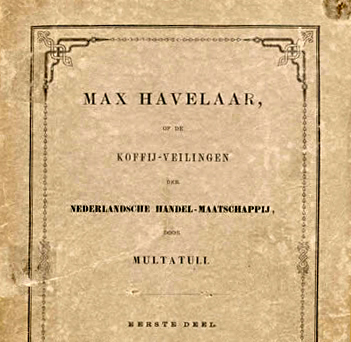
More than 140 years after it was first published, Max Havelaar was voted the top book of Dutch literature by the Society of Dutch Literature. New editions are published nearly every year. The work has been made into a comic book, a movie and a play.
It’s now translated into 40 languages and has become so part of the Dutch cultural landscape, “Max Havelaar” now denotes fair trade coffee in the Netherlands.
For all of its success, the novel begins simply enough. “I am a coffee broker and live at Lauriergracht, No 37.” (Ik ben makelaar in koffi, en woon op de Lauriergracht, No. 37.)
The book is a frame story, with multiple narratives set within the novel. Batavus Droogstoppel, the aforementioned coffee broker, opens the book, serving as the fictitious author. We don’t meet the titular Max Havelaar until nearly 80 pages into the work.
Our second narrator, Ernest Stern, describes the life of Havelaar more completely. Havelaar is a civil servant in the Dutch East Indies and while Droogstoppel portrays himself as an upstanding, religious man, Havelaar’s view on the ground shows another reality.
In the final section, the author Multatuli interrupts the story to argue that the Dutch colonial rule in Indonesia was deeply problematic. Multatuli makes it clear that he only told the story to draw the reader to make his point the Dutch authorities.
“The novel suddenly turns out to be a pamphlet,” Herman Pleij, professor of Dutch Literature, told NPO in an interview about the work in 2017. This deception was uncommon in literature at the time.
Eduard Douwes Dekker, the real author of Max Havelaar, wrote the work in just five weeks while living in Brussels after returning from working in the Dutch East Indies. He wrote under the pseudonym Multatuli, which is Latin for ‘I have borne much suffering,’ because he didn’t want people to make assumptions based on who he was.
Douwes Dekker joined his father when he left for a civil servant position in Batavia in 1838. The 18-year-old found a position in the Dutch administration and quickly grew unhappy with his career because of how poorly the local population was treated. He returned to Europe in 1859 disillusioned and wrote Max Havelaar.
The manuscript was published a year later and, according to historians, Multatuli became the most discussed man in The Netherlands. Douwes Dekker is now sometimes referred to as a whistleblower.
Journalists and writers at the time broadly agreed that something must be done about the situation in Indonesia and the colonial authorities ultimately made changes to their governance under pressure from the public.
Other Dutch classics, like The Evenings, The Discovery of Heaven and Beyond Sleep also had an impact on society when they were first published but none had quite as much of an effect as Max Havelaar.
There are dozens of translations of the work available. The edition from Penguin Classics is translated by Roy Edwards, who also translated Willem Frederik Hermans’ The Darkroom of Damocles and Marga Minco’s Bitter Herbs, offers a nice balance of modernising some of the archaic language and maintaining the style of the time.
You can get your copy at the American Book Center.
